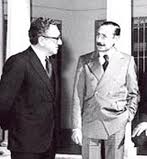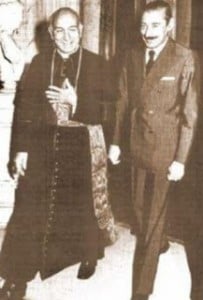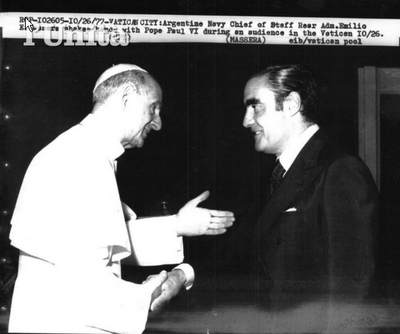Cardinal Jorge Mario Bergoglio and Argentina’s “Dirty War”
In the course of the last two years, Pope Francis has been portrayed in chorus by the Western media as an antiwar activist and a left leaning champion of “Liberation Theology” committed to World peace and global poverty alleviation.
His September 24 speech to the US Congress was described as “stunning in the breadth, depth, and conviction of its progressivism.”
“If President Barack Obama had delivered the text of Pope Francis’s speech to Congress Thursday [September 24, 2015] as a State of the Union address, he would have risked being denounced by Republicans as a socialist.”
Who is Pope Francis? Who was he before he became Pope?
Pope Francis is said to have brought “Liberation Theology into the Vatican”, in the footsteps of Francis of Assisi. While highlighting his commitment to peace and social justice, the Western media fail to mention that Jorge Mario Bergoglio (Pope Francis I) has been a staunch supporter of US imperial interests in Latin America for more than 30 years.
While heralded by antiwar activists as a “progressive”, Pope Francis was one of the main supporters –within the Catholic hierarchy– of Argentina’s military dictatorship which came to power in a CIA supported coup in 1976.
Jorge Mario Bergoglio not only supported the US sponsored dictatorship, he also played a direct and complicit role in the “Dirty War” (la guerra sucia”) in liaison with the military Junta headed by General Jorge Videla, leading to the arrest, imprisonment, torture and disappearance of progressive Catholic priests and laymen who were opposed to Argentina’s military rule.
“While the two priests Francisco Jalics y Orlando Yorio, kidnapped by the death squads in May 1976 were released five months later. after having been tortured, six other people associated with their parish kidnapped as part of the same operation were “disappeared” (desaparecidos).”
Liberation Theology
Liberation Theology has become a convenient tool of media propaganda: the protagonists of oppression are portrayed as liberators. Pope Francis I, heralded as the champion of Liberation in Latin America is now bringing his message to Palestine: According to Naim Ateek, the founder of Liberation Theology in Palestine, quoted in TIME, “We feel he has been able to speak about the poor in Latin America,… Now we would like to see him speak about the oppressed in Palestine.”
At a historic meeting at the Vatican in early May 2014 with UN Secretary-General Ban Ki-moon, Pope Francis I urged world leaders to challenge “all forms of injustice” and resist the “economy of exclusion… the throwaway culture, … and the “culture of death,” [which] … sadly risk becoming passively accepted.” (National Catholic Reporter, May 26, 2014.
Careful choice of words by Pope Francis: The CIA’s “dirty war” in Latin America under Operation Condor in which Pope Francis actively participated was predicated on the “Culture of Death”. The 1976 military coup was supported by Wall Street precisely with a view to imposing “the economy of exclusion” (namely neoliberalism) conducive to the impoverishment of the Argentinian population.
The following article was first written in March 2013 following the election of Cardinal Jorge Mario Bergoglio as Pope Francis I by the Vatican conclave.
“Washington’s Pope”? Who is Pope Francis I? Cardinal Jorge Mario Bergoglio and Argentina’s “Dirty War”
by Michel Chossudovsky
March 13, 2013
[see update on the Secret Memorandum]
The Vatican conclave has elected Cardinal Jorge Mario Bergoglio as Pope Francis I
Who is Jorge Mario Bergoglio?
In 1973, he had been appointed “Provincial” of Argentina for the Society of Jesus.
In this capacity, Bergoglio was the highest ranking Jesuit in Argentina during the military dictatorship led by General Jorge Videla (1976-1983).
He later became bishop and archbishop of Buenos Aires. Pope John Paul II elevated him to the title of cardinal in 2001
When the military junta relinquished power in 1983, the duly elected president Raúl Alfonsín set up a Truth Commission pertaining to the crimes underlying the “Dirty War” (La Guerra Sucia).
The military junta had been supported covertly by Washington.
US. Secretary of State Henry Kissinger played a behind the scenes role in the 1976 military coup.
Kissinger’s top deputy on Latin America, William Rogers, told him two days after the coup that “we’ve got to expect a fair amount of repression, probably a good deal of blood, in Argentina before too long.” … (National Security Archive, March 23, 2006)
“Operation Condor”
Ironically, a major trial opened up in Buenos Aires on March 5, 2013 a week prior to Cardinal Bergoglio’s investiture as Pontiff. The ongoing trial in Buenos Aires is: “to consider the totality of crimes carried out under Operation Condor, a coordinated campaign by various US-backed Latin American dictatorships in the 1970s and 1980s to hunt down, torture and murder tens of thousands of opponents of those regimes.”
For further details, see Operation Condor: Trial On Latin American Rendition And Assassination Program By Carlos Osorio and Peter Kornbluh, March 10, 2013
(Photo above: Henry Kissinger and General Jorge Videla (1970s)
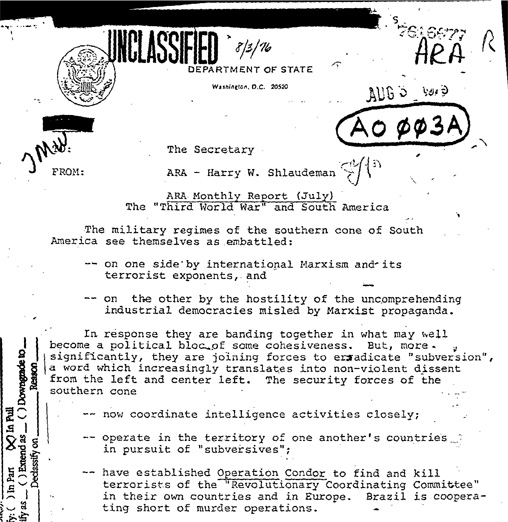
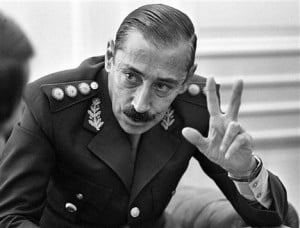 The military junta led by General Jorge Videla (left) was responsible for countless assassinations, including priests and nuns who opposed military rule following the CIA sponsored March 24, 1976 coup which overthrew the government of Isabel Peron:
The military junta led by General Jorge Videla (left) was responsible for countless assassinations, including priests and nuns who opposed military rule following the CIA sponsored March 24, 1976 coup which overthrew the government of Isabel Peron:
”Videla was among the generals convicted of human rights crimes, including “disappearances”, torture, murders and kidnappings. In 1985, Videla was sentenced to life imprisonment at the military prison of Magdalena.”
Wall Street and the Neoliberal Economic Agenda
One of the key appointments of the military junta (on the instructions of Wall Street) was the Minister of Economy, Jose Alfredo Martinez de Hoz, a member of Argentina’s business establishment and a close friend of David Rockefeller.
The neoliberal macro-economic policy package adopted under Martinez de Hoz was a “carbon copy” of that imposed in October 1973 in Chile by the Pinochet dictatorship under advice from the “Chicago Boys”, following the September 11, 1973 coup d’Etat and the assassination of president Salvador Allende.
Wages were immediately frozen by decree. Real purchasing power collapsed by more than 30 percent in the 3 months following the March 24, 1976 military coup. (Author’s estimates, Cordoba, Argentina, July 1976). The Argentinean population was impoverished.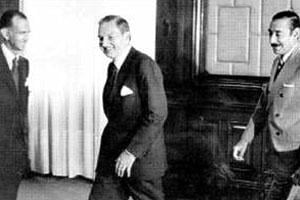
Under the helm of Minister of Economy Jose Alfredo Martinez de Hoz, central bank monetary policy was largely determined by Wall Street and the IMF. The currency market was manipulated. The Peso was deliberately overvalued leading to an insurmountable external debt. The entire national economy was precipitated into bankruptcy.
(See Image right: From left to right: Jose Alfredo Martinez de Hoz, David Rockefeller and General Jorge Videla)
Wall Street and the Catholic Church Hierarchy
Wall Street was firmly behind the military Junta which waged “The Dirty War” on its behalf. In turn, the Catholic Church hierarchy played a central role in sustaining the legitimacy of the military Junta.
The Order of Jesus –which represented the Conservative yet most influential faction within the Catholic Church, closely associated with Argentina’s economic elites– was firmly behind the military Junta, against so-called “Leftists” in the Peronista movement.
“The Dirty War”: Allegations directed Against Cardinal Jorge Mario Bergoglio
Condemning the military dictatorship (including its human rights violations) was a taboo within the Catholic Church. While the upper echelons of the Church were supportive of the military Junta, the grassroots of the Church was firmly opposed to the imposition of military rule.
In 2005, human rights lawyer Myriam Bregman filed a criminal suit against Cardinal Jorge Bergoglio, accusing him of conspiring with the military junta in the 1976 kidnapping of two Jesuit priests.
Several years later, the survivors of the “Dirty War” openly accused Cardinal Jorge Bergoglio of complicity in the kidnapping of priests Francisco Jalics y Orlando Yorio as well six members of their parish, (El Mundo, 8 November 2010)
(Image Left: Jorge Mario Bergoglio and General Jorge Videla)
Bergoglio, who at the time was “Provincial” for the Society of Jesus, had ordered the two “Leftist” Jesuit priests and opponents of military rule “to leave their pastoral work” (i.e. they were fired) following divisions within the Society of Jesus regarding the role of the Catholic Church and its relations to the military Junta.
While the two priests Francisco Jalics y Orlando Yorio, kidnapped by the death squads in May 1976 were released five months later. after having been tortured, six other people associated with their parish kidnapped as part of the same operation were “disappeared” (desaparecidos). These included four teachers associated with the parish and two of their husbands.
Upon his release, Priest Orlando Yorio “accused Bergoglio of effectively handing them over [including six other people] to the death squads … Jalics refused to discuss the complaint after moving into seclusion in a German monastery.” (Associated Press, March 13, 2013, emphasis added),
“During the first trial of leaders of the military junta in 1985, Yorio declared, “I am sure that he himself gave over the list with our names to the Navy.” The two were taken to the notorious Navy School of Mechanics (ESMA) torture center and held for over five months before being drugged and dumped in a town outside the city. (See Bill van Auken, “The Dirty War” Pope, World Socialist Website and Global Research, March 14, 2013
Among those “disappeared” by the death squads were Mónica Candelaria Mignone and María Marta Vázquez Ocampo, respectively daughter of the founder of of the CELS (Centro de Estudios Legales y Sociales) Emilio Mignone and daughter of the president of Madres de Plaza de Mayo, Martha Ocampo de Vázquez. (El Periodista Online, March 2013).
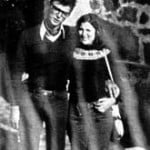 María Marta Vásquez, her husband César Lugones (see picture right) and Mónica Candelaria Mignone allegedly “handed over to the death squads” by Jesuit “Provincial” Jorge Mario Bergoglio are among the thousands of “desaparecidos” (disappeared) of Argentina’s “Dirty War”, which was supported covertly by Washington under “Operation Condor”. (See memorialmagro.com.ar)
María Marta Vásquez, her husband César Lugones (see picture right) and Mónica Candelaria Mignone allegedly “handed over to the death squads” by Jesuit “Provincial” Jorge Mario Bergoglio are among the thousands of “desaparecidos” (disappeared) of Argentina’s “Dirty War”, which was supported covertly by Washington under “Operation Condor”. (See memorialmagro.com.ar)
In the course of the trial initiated in 2005:
“Bergoglio [Pope Francis I] twice invoked his right under Argentine law to refuse to appear in open court, and when he eventually did testify in 2010, his answers were evasive”: “At least two cases directly involved Bergoglio. One examined the torture of two of his Jesuit priests — Orlando Yorio and Francisco Jalics — who were kidnapped in 1976 from the slums where they advocated liberation theology. Yorio accused Bergoglio of effectively handing them over to the death squads... by declining to tell the regime that he endorsed their work. Jalics refused to discuss it after moving into seclusion in a German monastery.” (Los Angeles Times, April 1, 2005 emphasis added)
The Secret Memorandum
The military government acknowledged in a Secret Memo (see below) that Father Bergoglio had accused the two priests of having established contacts with the guerilleros, and for having disobeyed the orders of the Church hierarchy (Conflictos de obedecencia). It also stated that the Jesuit order had demanded the dissolution of their group and that they had refused to abide by Bergoglio’s instructions.
The document acknowledges that the “arrest” of the two priests, who were taken to the torture and detention center at the Naval School of Mechanics, ESMA, was based on information transmitted by Father Bergoglio to the military authorities. (signed by Mr. Orcoyen)
(see below).
While a former member of the priests group had joined the insurgency, there was no evidence of the priests having contacts with the guerrilla movement.
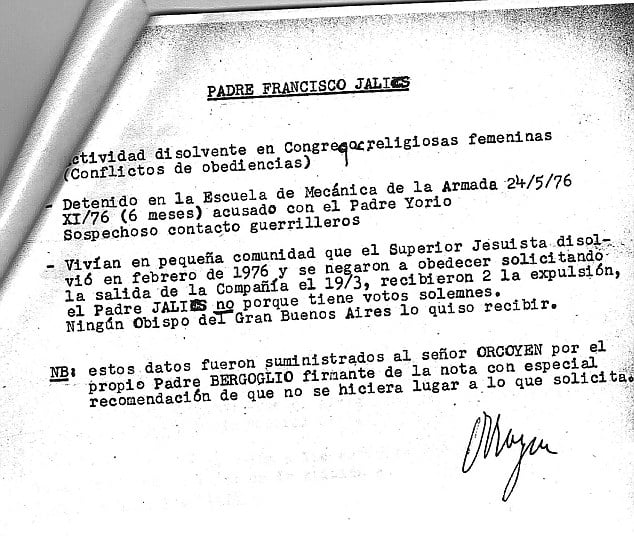 “Holy Communion for the Dictators”
“Holy Communion for the Dictators”
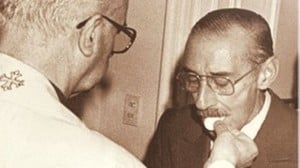 The accusations directed against Bergoglio regarding the two kidnapped Jesuit priests and six members of their parish are but the tip of the iceberg. While Bergoglio was an important figure in the Catholic Church, he was certainly not alone in supporting the Military Junta.
The accusations directed against Bergoglio regarding the two kidnapped Jesuit priests and six members of their parish are but the tip of the iceberg. While Bergoglio was an important figure in the Catholic Church, he was certainly not alone in supporting the Military Junta.
According to lawyer Myriam Bregman: “Bergoglio’s own statements proved church officials knew from early on that the junta was torturing and killing its citizens”, and yet publicly endorsed the dictators. “The dictatorship could not have operated this way without this key support,” (Los Angeles Times, April 1, 2005 emphasis added)
(Image right: General Jorge Videla takes communion. Date and name of priest unconfirmed)
The entire Catholic hierarchy was behind the US sponsored military dictatorship. It is worth recalling that on March 23, 1976, on the eve of the military coup:
“Videla and other plotters received the blessing of the Archbishop of Paraná, Adolfo Tortolo, who also served as vicar of the armed forces. The day of the takeover itself, the military leaders had a lengthy meeting with the leaders of the bishop’s conference. As he emerged from that meeting, Archbishop Tortolo stated that although “the church has its own specific mission . . . there are circumstances in which it cannot refrain from participating even when it is a matter of problems related to the specific order of the state.” He urged Argentinians to “cooperate in a positive way” with the new government.” (The Humanist.org, January 2011, emphasis added)
In an interview conducted with El Sur, General Jorge Videla, who is now [passed away in May 2013] serving a life sentence for crimes against humanity confirmed that:
“He kept the country’s Catholic hierarchy informed about his regime’s policy of “disappearing” political opponents, and that Catholic leaders offered advice on how to “manage” the policy.
Jorge Videla said he had “many conversations” with Argentina’s primate, Cardinal Raúl Francisco Primatesta, about his regime’s dirty war against left-wing activists. He said there were also conversations with other leading bishops from Argentina’s episcopal conference as well as with the country’s papal nuncio at the time, Pio Laghi.
“They advised us about the manner in which to deal with the situation,” said Videla” (Tom Henningan, Former Argentinian dictator says he told Catholic Church of disappeared, Irish Times, July 24, 2012, emphasis added)
It is worth noting that according to a 1976 statement by Archbishop Adolfo Tortolo, the military would always consult with a member of the Catholic hierarchy in the case of the “arrest” of a grassroots member of the clergy. This statement was made specifically in relation to the two kidnapped Jesuit priests, whose pastoral activities were under the authority of Society of Jesus “provincial” Jorge Mario Bergoglio. (El Periodista Online, March 2013).
In endorsing the military Junta, the Catholic hierarchy was complicit in torture and mass killings, an estimated “22,000 dead and disappeared, from 1976 to 1978 … Thousands of additional victims were killed between 1978 and 1983 when the military was forced from power.” (National Security Archive, March 23, 2006).
The Role of the Vatican
The Vatican under Pope Paul VI and Pope John Paul II played a central role in supporting the Argentinian military Junta.
Pio Laghi, the Vatican’s apostolic nuncio to Argentina admitted “turning a blind eye” to the torture and massacres.
Laghi had personal ties to members of the ruling military junta including General Jorge Videla and Admiral Emilio Eduardo Massera.
(See image left. Vatican’s Nuncio Pio Laghi and General Jorge Videla)
Admiral Emilio Massera in close liaison with his US handlers, was the mastermind of “La Guerra Sucia” (The Dirty War). Under the auspices of the military regime, he established:
“an interrogation and torture centre in the Naval School of Mechanics, ESMA [close to Buenos Aires], … It was a sophisticated, multi-purpose establishment, vital in the military plan to assassinate an estimated 30,000 “enemies of the state”. … Many thousands of ESMA’s inmates, including, for instance, two French nuns, were routinely tortured mercilessly before being killed or dropped from aircraft into the River Plata.
Massera, the most forceful member of the triumvirate, did his best to maintain his links with Washington. He assisted in the development of Plan Cóndor, a collaborative scheme to co-ordinate the terrorism being practised by South American military régimes. (Hugh O’Shaughnessy, Admiral Emilio Massera: Naval officer who took part in the 1976 coup in Argentina and was later jailed for his part in the junta’s crimes, The Independent, November 10, 2010, emphasis added)
Reports confirm that the Vatican’s representative Pio Laghi and Admiral Emilio Massera were friends.
(right: Admiral Emilio Massera, architect of “The Dirty War” received by Pope Paul VI at the Vatican)
The Catholic Church: Chile versus Argentina
It is worth noting that in the wake of the military coup in Chile on September 11,1973, the Cardinal of Santiago de Chile, Raul Silva Henriquez openly condemned the military junta led by General Augusto Pinochet. In marked contrast to Argentina, this stance of the Catholic hierarchy in Chile was instrumental in curbing the tide of political assassinations and human rights violations directed against supporters of Salvador Allende and opponents of the military regime.
The man behind the interfaith Comité Pro-Paz was Cardinal Raúl Silva Henríquez. Shortly after the coup, Silva, … stepped into the role of “upstander,”a term the author and activist Samantha Power coined to distinguish people who stand up to injustice—often at great personal risk—from “bystanders.”
… Soon after the coup, Silva and other church leaders published a declaration condemning and expressing sorrow for the bloodshed. This was a fundamental turning point for many members of the Chilean clergy… The cardinal visited the National Stadium and, shocked by the scale of the government crackdown, instructed his aides to begin collecting information from the thousands flocking to the church for refuge.
Silva’s actions led to an open conflict with Pinochet, who did not hesitate to threaten the church and the Comité Pro-Paz. (Taking a Stand Against Pinochet: The Catholic Church and the Disappeared pdf)
Had the Catholic hierarchy in Argentina and Jorge Mario Bergoglio taken a similar stance to that of Cardinal Raul Silva Henriquez, thousands of lives would have been saved.
Jorge Mario Bergoglio was not, in the words of Samantha Power, a “bystander”. He was complicit in extensive crimes against humanity.
Neither is Pope Francis “a Man of the People” committed to “helping the poor” in the footsteps of Saint Francis of Assisi, as portrayed in chorus by the Western media mantra. Quite the opposite: his endeavors under the military Junta, consistently targeted progressive members of the Catholic clergy as well as committed human rights activists involved in grassroots anti-poverty programs.
In supporting Argentina’s “Dirty War”, Jorge Mario Bergoglio has blatantly violated the very tenets of Christian morality which cherish the value of human life. Author’s message to Pope Francis: “Thou shalt not kill”
“Operation Condor” and the Catholic Church
The election of Cardinal Bergoglio by the Vatican conclave to serve as Pope Francis I will have immediate repercussions regarding the ongoing “Operation Condor” Trial in Buenos Aires.
The Church was involved in supporting the military Junta. This is something which will emerge in the course of the trial proceedings. No doubt, there will be attempts to obfuscate the role of the Catholic hierarchy and the newly appointed Pope Francis I, who served as head of Argentina’s Jesuit order during the military dictatorship.
Jorge Mario Bergoglio: “Washington’s Pope in the Vatican”?
The election of Pope Francis I has broad geopolitical implications for the entire Latin American region.
In the 1970s, Jorge Mario Bergoglio was supportive of a US sponsored military dictatorship.
The Catholic hierarchy in Argentina supported the military government. The Junta’s program of torture, assassinations and ‘disappearances” of thousands of political opponents was coordinated and supported by Washington under the CIA’s “Operation Condor”.
Wall Street’s interests were sustained through Jose Alfredo Martinez de Hoz’ office at the Ministry of Economy.
The Catholic Church in Latin America is politically influential. It also has a grip on public opinion. This is known and understood by the architects of US foreign policy as well as US intelligence.
In Latin America, where a number of governments are now challenging US hegemony, one would expect –given Bergoglio’s track record– that the new Pontiff Francis I as leader of the Catholic Church, will play de facto, a discrete “undercover” political role on behalf of Washington.
With Jorge Bergoglio, Pope Francis I in the Vatican –who faithfully served US interests in the heyday of General Jorge Videla and Admiral Emilio Massera– the hierarchy of the Catholic Church in Latin America can once again be effectively manipulated to undermine “progressive” (Leftist) governments, not only in Argentina (in relation to the government of Cristina Kirschner) but throughout the entire region, including Venezuela, Ecuador and Bolivia.
The instatement of “a pro-US pope” occurred a week following the death of president Hugo Chavez.
“Regime Change” at the Vatican
The US State Department routinely pressures members of the United Nations Security Council with a view to influencing the vote pertaining to Security Council resolutions.
US covert operations and propaganda campaigns are routinely applied with a view to influencing national elections in different countries around the World.
Similarly, the CIA has a longstanding covert relationship with the Vatican.
Did the US government attempt to influence the outcome of the election of the new pontiff?
Firmly committed to serving US foreign policy interests in Latin America, Jorge Mario Bergoglio was Washington’s preferred candidate.
Were undercover pressures discretely exerted by Washington, within the Catholic Church, directly or indirectly, on the 115 cardinals who are members of the Vatican conclave?
Who is Pope Francis I, Interview of Michel Chossudovsky with Bonnie Faulkner, Guns and Butter, KPFA Pacifica
Global Research TV (GRTV) Interview with Michel Chossudovsky
Author’s Note
From the outset of the military regime in 1976, I was Visiting Professor at the Social Policy Institute of the Universidad Nacional de Cordoba, Argentina. My major research focus at the time was to investigate the social impacts of the deadly macroeconomic reforms adopted by the military Junta.
I was teaching at the University of Cordoba during the initial wave of assassinations which also targeted progressive grassroots members of the Catholic clergy.
The Northern industrial city of Cordoba was the center of the resistance movement. I witnessed how the Catholic hierarchy actively and routinely supported the military junta, creating an atmosphere of intimidation and fear throughout the country. The general feeling at the time was that Argentinians had been betrayed by the upper echelons of the Catholic Church.
Three years earlier, at the time of Chile’s September 11, 1973 military coup, leading to the overthrow of the Popular Unity government of Salvador Allende, I was Visiting Professor at the Institute of Economics, Catholic University of Chile, Santiago de Chile.
In the immediate wake of the coup in Chile, I witnessed how the Cardinal of Santiago, Raul Silva Henriquez –acting on behalf of the Catholic Church– confronted the military dictatorship.

